
Transplantation Journal - Vol. 4, No. 6, June 2018
The June issue of Transplantation Direct contains articles and communications on a variety of topics in transplantation. Among the topics reported in kidney transplantation are the interim results of the Amsterdam, LEden, GROningen randomized trial testing immunosuppression minimization (steroids/tacrolimus) in over 300 patients. A study from the UK assesses the value of low clearance transplantation clinics that support the management of recipients with failing kidney transplants. In liver transplantation, a large Eurotransplant-data-based study examines the impact of organ implantation time on outcomes, and an interesting case control study looks at the association of DSA development on late-onset PTLD. In the area of infectious disease research in organ and stem cell transplant recipients, the meaning of CMV PCR "blips" is examined and the implications discussed. Organ donation issues are also addressed in this Direct issue. The Canadian National Transplant Research Program reports on their survey results defining future research priorities in organ and stem cell donation. Also, a Living Organ Video Educated Donors (LOVED) program aims to address living donor kidney transplantation disparities in African Americans; the results and impact of this program are reported on here. We hope that you find this content interesting and useful, and look forward to future contributions from your group.
Study Seeks to Improve Kidney Transplant Outcomes
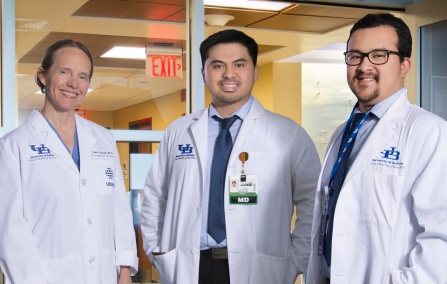
From left, Liise K. Kayler, MD; John Reinier F. Narvaez, MD (He will be presenting at TTS 2018, click for presentation details); and medical student Kevin Espino have published a study on using enhanced recovery after surgery protocols to improve kidney transplant patient outcomes.
May 30 - Improving outcomes for kidney transplant patients is the goal of newly published research led by Liise K. Kayler, MD, clinical professor of surgery.
Hard-to-Treat Infections May Not Impact Survival of CF Patients After Lung Transplant, Study Shows
One-year survival after a lung transplant of cystic fibrosis (CF) patients chronically infected with antibiotic-resistant bacteria is similar to those without infections, according to a retrospective analysis of data from the International Society of Heart and Lung Transplantation (ISHLT) Thoracic Transplant Registry.
Understanding immune system interplay to improve organ transplant success
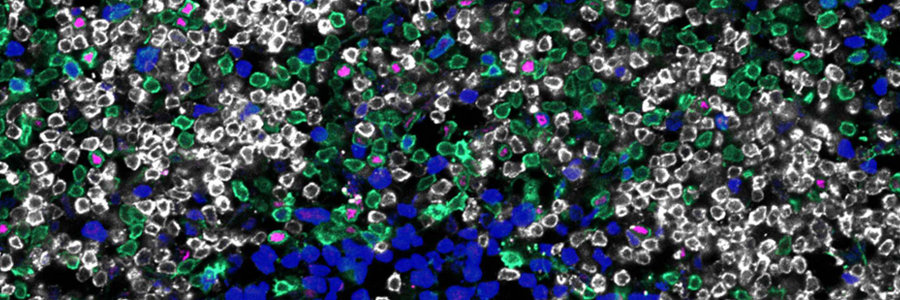
Credit: Babraham Institute
May 31 - A rare opportunity to analyse both blood and tissue samples from human transplant recipients has allowed immunology researchers at the Babraham Institute to pinpoint how an immunosuppressive drug works to prevent the production of antibodies against the transplanted tissue.
LOng-TIME TTS MEMBER, Robert S. Gaston honored with Lifetime Achievement Award
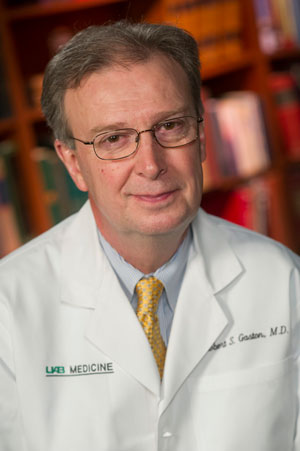 The Transplantation Society congratulates Dr. Gaston on behalf of all his fellow TTS members.
The Transplantation Society congratulates Dr. Gaston on behalf of all his fellow TTS members.
Dr. Gaston is a nephrologist who has dedicated more than 30 years to medicine was awarded with the highest honor that the AST bestows – the Lifetime Achievement Award. In addition to his broad experience in hypertension, immunology, public policy, and solid organ transplantation, much of Dr. Gaston's work has focused on drug development to address the challenge of improving long-term graft survival in kidney transplant recipients. He has been involved in clinical investigation since the 1990s, with research funded by industry, foundation, and government, and he has authored more than 300 published articles, chapters, and abstracts. Dr. Gaston's expertise is nationally recognized and has resulted in ongoing consultation for the National Institutes of Health (NIH), US Food and Drug Administration (FDA), several academic institutions, and industry (biotech and large pharma).
Pig organs for human patients: A challenge fit for CRISPR
May 30 - Through a new license, Harvard lab's innovations in genome engineering might solve the organ transplant shortage
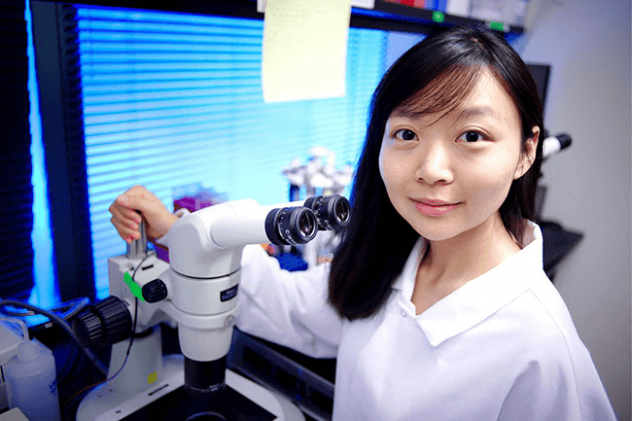
Co-founded by Professor George Church and former HMS doctoral student Luhan Yang, Ph.D. (pictured), eGenesis has exclusive access, in the field of xenotransplantation, to foundational intellectual property (IP) on CRISPR, as well as certain subsequent innovations. The license includes IP relating to the Church Lab's 2012 breakthrough use of CRISPR, led by Yang and Prashant Mali, Ph.D., to edit the genome of human cells. (Photo courtesy of eGenesis.)
Over the past few years, researchers led by George Church, Ph.D., the Robert Winthrop Professor of Genetics at Harvard Medical School (HMS) and a Core Faculty Member of Harvard's Wyss Institute for Biologically Inspired Engineering, have made important strides toward engineering the genomes of pigs to make their cells compatible with the human body. A healthy heart for a patient in desperate need might one day come from a pig.
CLICK HERE TO READ THE FULL ARTICLE
 Don't miss our July 1 Pre-Congress Workshop @TTS 2018
Don't miss our July 1 Pre-Congress Workshop @TTS 2018
Xenotransplantation - Advancing to the Clinic
The field of xenotransplantation has made significant progress over the last 5 years, with cell and organ graft survival in large animal models reaching almost 3 years. The aim of the workshop is to present the most recent advances and the outlook for the first clinical trials.
UK - Case Study: DHSC's 'opt-out' organ donation consultation campaign attracts 17,000 responses
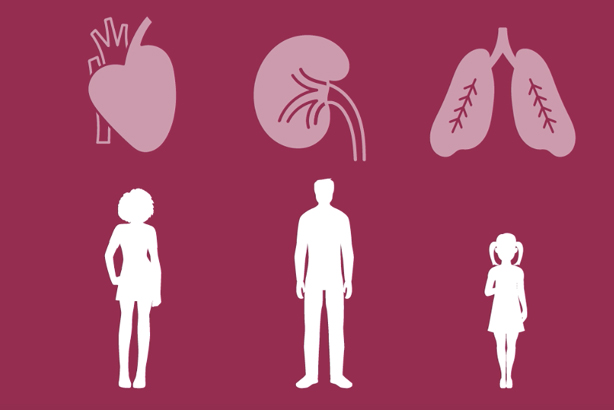
DHSC targeted families with campaign for consultation on organ donor opt-in
May 30 - Health comms specialists have been challenged to encourage people to open up about a subject many are unwilling to face - whether or not to donate their organs, or those of their loved ones, after their death.
Researchers find secret of newt species' amazing regeneration

Japanese fire belly newt (cynops pyrrhogaste) (Provided by Chikafumi Chiba)
A type of Japanese newt can regrow its tail, eyes, brain and even parts of its heart throughout its lifetime thanks to a specific type of red blood cell, a Japanese research team has found.
The promise of regenerating tissues and organs from inside the body
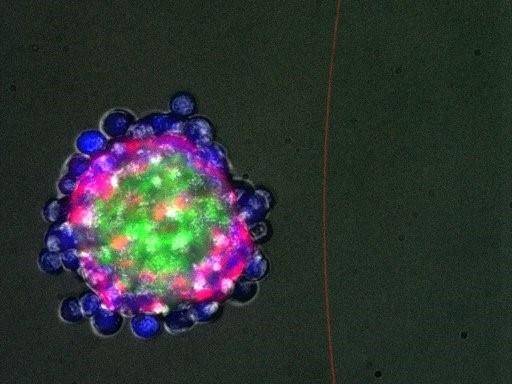
A three-layered sphere created in the Lim Lab by programming synNotch receptors on groups of cells.
(Wendell Lim/UC San Francisco)
June 1 - Regenerative medicine holds tremendous promise for many ailments, from curing diabetes with pancreatic cell transplants to growing new organs for transplant. But because these approaches generate tissue ex vivo, or outside the body, scientists developing them all face the same conundrum: How can they connect these externally developed tissues to the bloodstream and the rest of the body so they can thrive?
CLICK HERE TO READ THE FULL ARTICLE
Transplantation - Featured Article
Submitted by Dr Karen Keung, Editorial Fellow, Transplantation.
Reduced TCR Signaling Contributes to Impaired Th17 Responses in Tolerant Kidney Transplant Recipients.
Nova-Lamperti E, Romano M, Christakoudi S, et al.
Transplantation. 2018;102(1):e10-e17
The development of operational tolerance in transplantation has been demonstrated to be associated with a numerous B cell related immune alterations, whilst the role of other lymphocyte subsets is less clear. In this study, CD4+ T cells from tolerant kidney transplant recipients (n = 17) were compared with those from patients with chronic rejection (n = 32) and healthy volunteers (n = 12) assessing their gene expression profile, phenotype and function upon activation. Tolerant patients were found to possess fewer Th17 cells, exhibited reduced Th17 responses after CD3/28 activation, and reduced TCR signaling which was linked with a decrease in IL-17 production by CD4+ T cells.
The authors have presented some novel evidence suggesting that incomplete Th17 pathway integrity may help facilitating clinical tolerance.
Timing is everything to build kidneys from scratch
June 4 - Researchers show stem cells fashion kidney functions based on when they converge
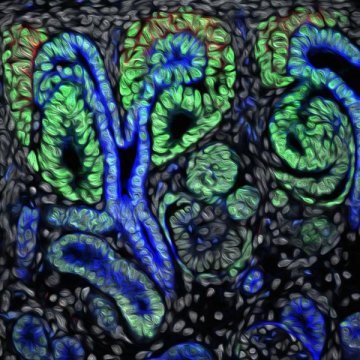
Developing human nephron, the filtering unit of the kidney.
Credit: Image by Nils O. Lindstrom and Tracy Tran/McMahon Lab USC Stem Cell
Perfectly punctual or fashionably late, it takes all kinds to build a kidney. So it is for stem cells building kidney tissue discovered timing is critical as the precise arrival of progenitor cells dictates their form and function in the kidney. The finding will help fabricate kidney components for use in drug tests and treatment of renal disease.
In the News
New approach could grow materials that exactly mimic bone or dental enamel
June 3 - A team of researchers, led by scientists at the Queen Mary University of London, has uncovered a new approach to grow synthetic mineralized materials. This exciting breakthrough points to a future of regenerative medicine where doctors could mimic the regrowth of hard tissues including dental enamel and bone.
CLICK TO READ THE FULL ARTICLE
Cell Transplant Trial for Spinal Injury Is Safe
June 1 - Four patients with chronic spinal damage and a complete loss of motor and sensory functions below their waists have received transplants of human neural stem cells in a first-of-its-kind clinical trial.
CLICK HERE TO READ THE ARTICLE
PAKSITAN - Kidney transplantation facility soon
June 7 - Deputy Commissioner Zahid Suhail said that kidney transplantation would begin soon at the recently established Kidney centre. He said this during his visit to the Kidney and Regional Blood centre here on Wednesday. The deputy commissioner inspected operation theater and outdoor of the health centre
Post-Transplant Tx Reduces Wait for Kidney in Hep C+ Patients
June 7 - Delaying treatment until after transplant doesn't adversely impact kidney allograft or survival.
First UK womb transplant 'by end of 2018'
June 5, 2018 - The surgeon planning to do the first womb transplant in the UK says he hopes to carry out the first operations "before the end of 2018".
Contact
Address
The Transplantation Society
International Headquarters
740 Notre-Dame Ouest
Suite 1245
Montréal, QC, H3C 3X6
Canada
Используйте Вавада казино для игры с бонусом — активируйте промокод и начните выигрывать уже сегодня!


